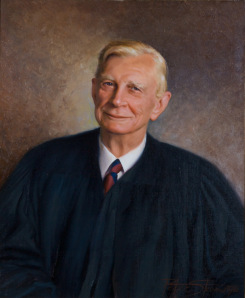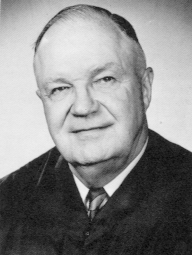
The Founders of the I'Anson-Hoffman Inn of Court
On
September 29, 1986, Dean Sullivan hosted a dinner at the Harbor
Club, in Norfolk, where a presentation was made by Sherman L. Cohn,
President of the American Inns of Court, concerning the purpose,
structure and program of the American Inns of Court. Present at the
meeting were Chief Justice I'Anson, Judge Hoffman, Judge Smith, and
Mr. Prince.
Dean
Sullivan committed the Marshall-Wythe School of Law to affiliation
with an Inn of Court for the Peninsula and South Hampton Roads
areas, and Chief Justice I'Anson l:\l1d Judge Hoffman accepted his
request that they jointly assume leadership in the formation of an
Inn for this area. Judge Smith and Mr. Prince collaborated with
Chief Justice I'Anson and Judge Hoffman and formed the original
steering committee, selected the charter membership, and met with
national representatives of the Inns of Court movement for the
organization and chartering of a local Inn.
The initial
meeting of the Inn was held on March 24, 1987, in the United States
Courthouse, in Norfolk, where a program of introduction was
presented, charter members were inducted, and officers were
elected. Mr. Prince was elected as the charter President, and Judge
Smith as Chancellor. The membership consisted of federal and state
judges, lawyers from Gloucester and Williamsburg to Virginia Beach,
and law professors and law students from the Marshall-Wythe "School
of Law. Planning was commenced for the initial program of meetings
to commence in the fall. Professor Felton was instrumental in the
establishment and implementation of the educational programs of the
Inn, as well as encouraging and securing the attendance of the law
student members.
Chief Justice Lawrence W. I'Anson

Lawrence
W. I'Anson, a native of Portsmouth, Virginia, graduated from the
College of William & Mary, and took his law degree from the
University of Virginia School of Law in 1931. Mr. I'Anson practiced
law in Portsmouth until 1938, when he was elected Portsmouth
Commonwealth's Attorney. Before he completed his first term in
office, he was appointed in 1941 as a Judge of the Portsmouth
Hustings Court (now Circuit Court). At the age of 34, he was one of
the youngest men ever appointed a trial judge in Virginia. Judge
I'Anson remained on the Hustings Court bench until 1958, when he
was appointed to the Virginia Supreme Court.
During his
service on the Supreme Court, Justice I'Anson distinguished himself
as a leader in judicial reform. Serving on the Judicial Council of
Virginia from 1948 to 1970, he was chairman of the committee which
published the Virginia Handbook for Jurors. In 1968, he was named
by Governor Mills E. Godwin as Chairman of the Virginia Court
System Study Commission, whose recommendations in 1971 resulted in
the complete reorganization of Virginia's courts into a unified
state system, with full-time district court judges and uniform
state-wide compensation for all judges. For his successful efforts
in the reformation of the Virginia court system, Justice I'Anson
was awarded the Lincoln Harley Award for judicial reform by the
American Judicature Society in 1973.
Justice
I'Anson became the 22nd Chief Justice of the Supreme Court of
Virginia on October 1, 1974. During his tenure, Chief Justice
I'Anson served as President of the National Center for State
Courts, and Vice-Chairman of the Conference of Chief Justices,
hosting the first national meeting of the conference in
Williamsburg in 1971.
The Chief
Justice endeared himself to all who worked with and for him,
through his personal warmth and good cheer, as well as the good
word he always seemed to have for every lawyer who appeared before
him.
Upon his
retirement from the Supreme Court, Chief Justice I'Anson continued
to serve as President of the Beazley Foundation, which he had led
since 1948, serving his home community of Portsmouth. Chief Justice
I'Anson died on December 17, 1990.
Judge Walter E. Hoffman

Walter E.
Hoffman, a native of Pennsylvania, graduated from the Wharton
School of Finance and Commerce of the University of Pennsylvania at
age 19, attended the Marshall- Wythe School of Law, where he passed
the Virginia bar examination after his first year. Mr. Hoffman
subsequently graduated from the Washington & Lee University
School of Law in 1931, a classmate of future Justice of the Supreme
Court of the United States Lewis F. Powell, and a contemporary of
Chief Justice I'Anson.
Mr. Hoffman
practiced law in Norfolk until 1954, when he was appointed to the
United States District Court for the Eastern District of Virginia,
as the resident judge in the Norfolk Division. The Norfolk and
Newport News Divisions of the Eastern District were notorious for
their backlog of cases, and Judge Hoffman set out to clear the
docket, holding court on evenings, weekends and holidays, as
necessary. In 1962, with things more under control, he seized upon
the solution for keeping the docket current in the future, and the
famed "Rocket Docket" of the Norfolk Division of the Eastern
District was begun. Almost forty years later, the docket control
rules remain a model for not only the federal court system but also
for state courts as well. Judge Hoffman eventually took
senior status and remained as such until his death on November 21,
1996.
During his
career on the federal bench, Judge Hoffman endeared himself to
legions of attorneys and gained particular respect and national
admiration for his expertise in admiralty law, to the extent that
Norfolk became a preferred venue for difficult admiralty issues, as
it remains today.
Among his most notable cases, Judge Hoffman presided over the
Norfolk school desegregation case and the 1958 closing of the
Norfolk public schools, as well as the criminal trials of
Vice-President of the United States Spiro T. Agnew, United States
District Judge Harry Claiborne of Nevada, and Governor Arch Moore
of West Virginia.
Of all of his
accomplishments, Judge Hoffman was most proud of the "Rocket
Docket," and his receipt of the Edward J. Devitt Award for
Distinguished Service to Justice in 1984. It is a fitting
tribute to Judge Hoffman that the United States Courthouse in
Norfolk bears his name.